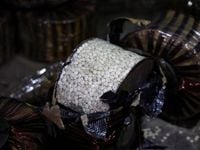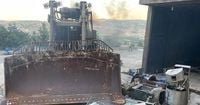On Monday, August 18, 2025, Iraq’s Ministry of Interior made an announcement that sent ripples through the region: a tip from Iraqi intelligence had led to the discovery and destruction of one of Lebanon’s largest Captagon factories, a major blow against the illicit amphetamine trade that has plagued the Middle East for years. According to reports from multiple outlets, including the Associated Press and Al Jazeera, the raid on the factory in Yammoune village, deep in Lebanon’s eastern Bekaa Valley, was carried out by the Lebanese army in mid-July after receiving actionable intelligence from their Iraqi counterparts. The operation resulted in the seizure of large quantities of drugs, marking a rare and significant moment of security cooperation between Iraq and Lebanon.
This coordinated effort comes at a time when regional governments are intensifying their crackdown on the Captagon trade, a shadowy business that has grown into a multibillion-dollar industry. The vast majority of the world’s Captagon—a highly addictive stimulant—has historically been produced in neighboring Syria, with Lebanon serving as both a production site and a critical transit point. Western governments have long estimated that the Captagon industry generated billions in revenue for former Syrian President Bashar al-Assad, his family, and their associates. The Assad regime, for its part, always denied such accusations.
The timing of the raid is no coincidence. With Assad’s ouster from power in December 2024, after opposition fighters took control of Damascus, the region’s approach to drug enforcement shifted dramatically. In the immediate aftermath, rebel groups uncovered massive stashes of Captagon in the Syrian capital—evidence, they claimed, of the former regime’s deep involvement in the trade. Ahmed al-Sharaa, who led the opposition fighters and now serves as Syria’s interim president, did not mince words. "The former regime turned Syria into the world’s leading source of Captagon," he declared, pledging a sweeping crackdown on both the manufacture and distribution of the drug.
The Bekaa Valley, where the Lebanese factory was found, has long been notorious as a hub for the production and trafficking of illicit substances. The destruction of such a large facility, therefore, represents a significant operational success for Lebanese authorities and their international partners. While the Lebanese army had issued a statement about the Yammoune raid back in July, it was Iraq’s Ministry of Interior that brought the full scope of the operation to light with its Monday announcement. As one senior Lebanese security official, speaking anonymously to comply with regulations, noted, "Lebanon’s security agencies are always in contact with Arab and international security agencies." Still, the official admitted some surprise at the timing of Iraq’s public statement, hinting at the often delicate dance of intelligence sharing and public attribution in the region.
The recent operation is just one piece of a much larger puzzle. In February 2025, as reported by The National and other outlets, the interior ministers of Lebanon, Syria, Jordan, and Iraq convened in Amman, Jordan’s capital, to discuss coordinated strategies against the illegal drug trade. The four countries agreed to establish a joint telecommunications cell, designed to streamline the exchange of intelligence and facilitate rapid responses to emerging threats. This cell, officials say, has already begun to bear fruit, with the Yammoune raid serving as a prime example of the potential for cross-border collaboration.
Jordan, meanwhile, has found itself in the uncomfortable position of being a major corridor for Captagon smuggling. Traffickers have long used the country as a transit route, ferrying pills out of Syria and Lebanon and into the lucrative markets of the oil-rich Arab Gulf states. The Gulf, with its high demand for stimulants and relative proximity, has become the primary destination for much of the region’s Captagon output. The international nature of the trade has made it a particularly thorny problem for law enforcement agencies, who must contend with well-funded, highly organized criminal networks that operate across borders with impunity.
For years, attempts to stem the tide of Captagon have been stymied by corruption, lack of coordination, and the political complexities of the region. The fall of Assad, however, appears to have shifted the calculus, opening new avenues for cooperation. As Ahmed al-Sharaa, Syria’s interim president, emphasized, "We are committed to dismantling the Captagon industry and restoring Syria’s reputation in the eyes of the world." Whether such pledges will translate into lasting change remains to be seen, but for now, regional officials are keen to highlight their successes.
The Yammoune operation has also drawn attention to the evolving role of intelligence sharing in the Middle East. Historically, relations between Iraq and Lebanon’s security agencies have been cautious at best, hampered by mutual suspicion and divergent political interests. Yet the urgency of the Captagon crisis appears to have fostered a new willingness to cooperate. According to Iraq’s Ministry of Interior, the tip that enabled the Lebanese raid was the product of weeks of careful surveillance and information gathering. Lebanese forces, acting swiftly on the intelligence, were able to dismantle the factory before traffickers could move their product out of the country.
International observers have welcomed the operation as a sign that regional governments are finally getting serious about tackling the Captagon epidemic. Western officials, who have long sounded the alarm about the drug’s proliferation and its links to organized crime and terrorism, hope that the recent uptick in cross-border cooperation will become the norm rather than the exception. "There is no doubt that the Captagon trade has destabilized the region and enriched some of its most dangerous actors," one European diplomat told BBC, speaking on condition of anonymity. "Every successful operation is a step in the right direction."
Still, challenges persist. The sheer scale of Captagon production in Syria and Lebanon, coupled with the ingenuity of the traffickers, means that law enforcement agencies remain locked in a high-stakes game of cat and mouse. Smuggling routes shift constantly, and new factories can spring up almost as quickly as old ones are destroyed. Moreover, the political instability that continues to roil parts of the region provides fertile ground for criminal enterprises to flourish.
Yet, amid the setbacks, there is a sense of cautious optimism. The destruction of the Yammoune factory is more than just a tactical victory; it is a symbol of what can be achieved when regional rivals put aside their differences and work toward a common goal. As the fight against Captagon continues, officials in Beirut, Baghdad, Damascus, and Amman know that sustained cooperation is their best hope for stemming the tide of addiction and restoring stability to their communities.
The road ahead will be long and fraught with obstacles, but for now, the successful operation in the Bekaa Valley stands as a testament to the power of intelligence sharing and the determination of those on the front lines of the war against drugs.






